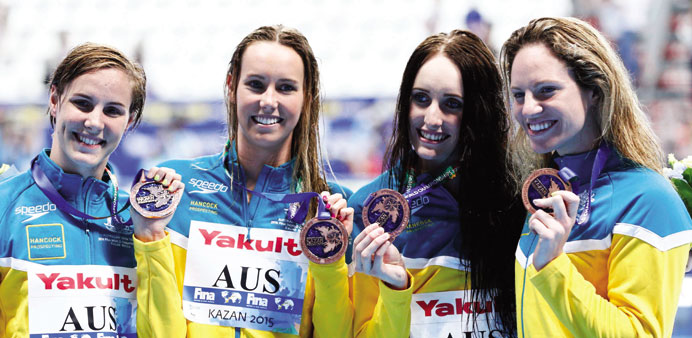Australia’s third placed Bronte Campbell, Emma McKeon, Taylor McKeown and Emily Seebohm pose with medlas after the women’s 4x100m medley relay final at the Aquatics World Championships in Kazan, Russia. (Reuters)
Reuters/Melbourne
Head coach Jacco Verhaeren praised the Australian swim team’s ‘phenomenal’ results at the world championships after landing their biggest medals haul in eight years, but his enthusiasm is certain to be tempered by some notable flops at Kazan.
Australia scooped seven gold, three silver and six bronze medals to finish the meet second behind the United States, who managed a total of 23 medals, including eight gold, despite the absence of some of their top swimmers.
Six of Australia’s titles came from three indivuduals, Emily Seebohm, Bronte Campbell and Mitch Larkin, who each took two golds.
“It was a big week, a fantastic week, we’ve seen a fantastic team, great performances,” Dutchman Verhaeren, former mentor to Olympic champions Pieter van den Hoogenband and Inge de Bruijn, told Australian media.
“There are still some youngsters who need to learn, and we will give them the opportunity to do so, but overall the outcome is phenomenal.”
The team’s haul was their biggest since the 2007 world championships in Melbourne when they took nine gold, seven silver and five bronze medals, and continues an upward trajectory since the depths of the 2012 London Olympics.
Proud swimming nation Australia failed to win a single individual title at London and slumped to their lowest medals tally in 20 years.
A review of the flop would later plunge the team into further acrimony, revealing management failures and the abuse of prescription drugs by the men’s 100 metres freestyle relay team.
Verhaeren, who has said the team’s culture problems have been dealt with, warned his swimmers not to get too complacent about the Kazan medal tally. “I think we should be careful getting ahead of ourselves,” he said. “We are still learning, there were great performances but we still have a lot to do to make it happen on an Olympic stage as well.”
Though Campbell’s rise was impressive, stepping out of the shadow of her higher profile sister and former world champion Cate to win the 50 and 100 freestyle titles, Larkin and Seebohm’s backstroke dominance was the highlight for Australia.
Both swept their 100 and 200 events, with Seebohm erasing the disappointment of London where she blamed a social media fixation for missing out on the gold. More concerning was Cameron McEvoy’s failure to step up as raging favourite to win the 100 metres freestyle. He was nearly half a second off his best in conceding the final to China’s Ning Zetao and was last in the 200 final.
Distance swimmer Mack Horton, who held the year’s best time in both the 400 and 1,500 freestyle prior to the meet, failed to make the final in both and left Kazan with a single bronze in the 800. Without McEvoy and two-time world champion James Magnussen, who was absent due to injury, Australia’s 4x100m freestyle relay team also crashed out in the preliminaries.
The Olympics will raise the bar and ensure far stiffer competition from the United States, leaving Verhaeren and his team with homework to do a year out from Rio.
“This sport is not about medal tallies, this sport is about individuals who work really hard for their performances and to make it happen here,” he said.
“The danger of medal tallies is that great performances disappear in a supposed fight between countries and that fight doesn’t exist.”

